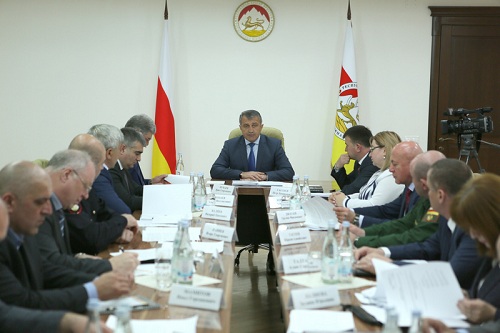
The Russian-backed authorities in Tskhinvali Region/South Ossetia intend to introduce new restrictions for residents of Akhalgori, one of the region’s districts with predominantly ethnic Georgian population.
The restrictions were announced by Tskhinvali leader Anatoly Bibilov, who visited the district on April 27 and held a working session with participation of Tskhinvali “ministers” and local administration officials.
Akhalgori, the territory of which was almost entirely under the jurisdiction of the central government before 2008, is home to 4,209 persons (roughly half of the pre-war population), according to the region’s authorities.
55.5% (2,337) of the total population are ethnic Georgians. Many residents of Akhalgori commute or periodically cross to the area from settlements of internally displaced persons located in the Tbilisi-administered territory.
Restrictions for Administration Employees
Anatoly Bibilov said at the meeting that the right to leave the region to the Tbilisi-administered territory for local district administration employees would be restricted.
“Some people have access to classified information, and like in any other normal state, these people should not be allowed to leave the republic without respective authorization,” Bibilov noted.
“You have to examine these people, [you have to examine] who leaves, why they leave, or why they leave without authorization,” he said, tasking the officials to address the issue “first at the level of unit heads, consultants and chief specialists.”
“You have to work with these people, you have to explain to these people that if it continues like that, we will have to dismiss them from work,” Bibilov told the attendees.
Passports for Residents Only
The Tskhinvali leader touched upon the passportization process as well, asking the district and village administration heads to compile information on Akhalgori residents “who leave the republic of South Ossetia [for Georgia], and those who do not leave the republic of South Ossetia.”
“It is necessary to ensure that those who do not leave the republic of South Ossetia receive passports … We have to address the passportization process once and for all; because some people are mistreating the republic of South Ossetia, those [permanently] living here and envisioning their future here should not be suffering,” he said.
Anatoly Bibilov made the statement in response to Mikhail Shabanov, the head of the region’s security service or KGB, who said the policy of the Georgian government in Akhalgori was to undermine “the sovereignty of South Ossetia” through “secretly encouraging the desires of the district’s [ethnic] Georgian population for full legalization [of their citizenship], and through demonstrating flexibility on maintaining their Georgian citizenship.”
Restrictions on Cattle Movement
The Tskhinvali leader also announced that seasonal movement of cattle from Akhalgori to winter pastures in Georgia proper would no longer be allowed.
“It took us a lot of time, efforts and energy, long negotiations, so that our meat products would be allowed to the Russian Federation … and we cannot afford to risk this, since there were several cases when cattle arrived from Georgia with diseases,” Bibilov said.
“Most likely, the cattle does not belong to the residents of South Ossetia, but belongs to Georgia[ns], who agree with local residents and use our pastures for their own benefit,” Anatoly Bibilov was quoted as saying.
Tatunashvili’s Death ‘Politicized’
Anatoly Bibilov commented on the death of Archil Tatunashvili, a thirty-five-year-old resident of Akhalgori, who died in Tskhinvali custody on February 22, and whose body was transferred to the Georgian authorities twenty-six days later.
Bibilov said Tatunashvili’s death was “politicized,” and that that Tskhinvali “became victim of an information war,” that aimed at instigating “hostility between Ossetians and Georgians living in the republic.”
“Friendly relations between Georgians and Ossetians living in South Ossetia is in the interests of neither Georgia, nor the United States and other western countries,” the Tskhinvali leader said.
He then underlined that Tskhinvali had nothing to do with Tatunashvili’s death. “What’s the point of murdering a person who is a source of information; this is merely a tragic event that can happen anywhere.”
Anatoly Bibilov also noted that the actions of Tskhinvali in the aftermath of Tatunashvili’s death were right. “Why are there still no results of [Tbilisi’s] forensic examination? Because they realized that we were right, and the examination conducted in South Ossetia cannot be challenged,” he stressed.
Later on April 27, Anatoly Bibilov discussed “a number of problematic issues” concerning Akhalgori at a “security council” meeting in Tskhinvali, though details of the meeting were not disclosed.
This post is also available in: ქართული Русский